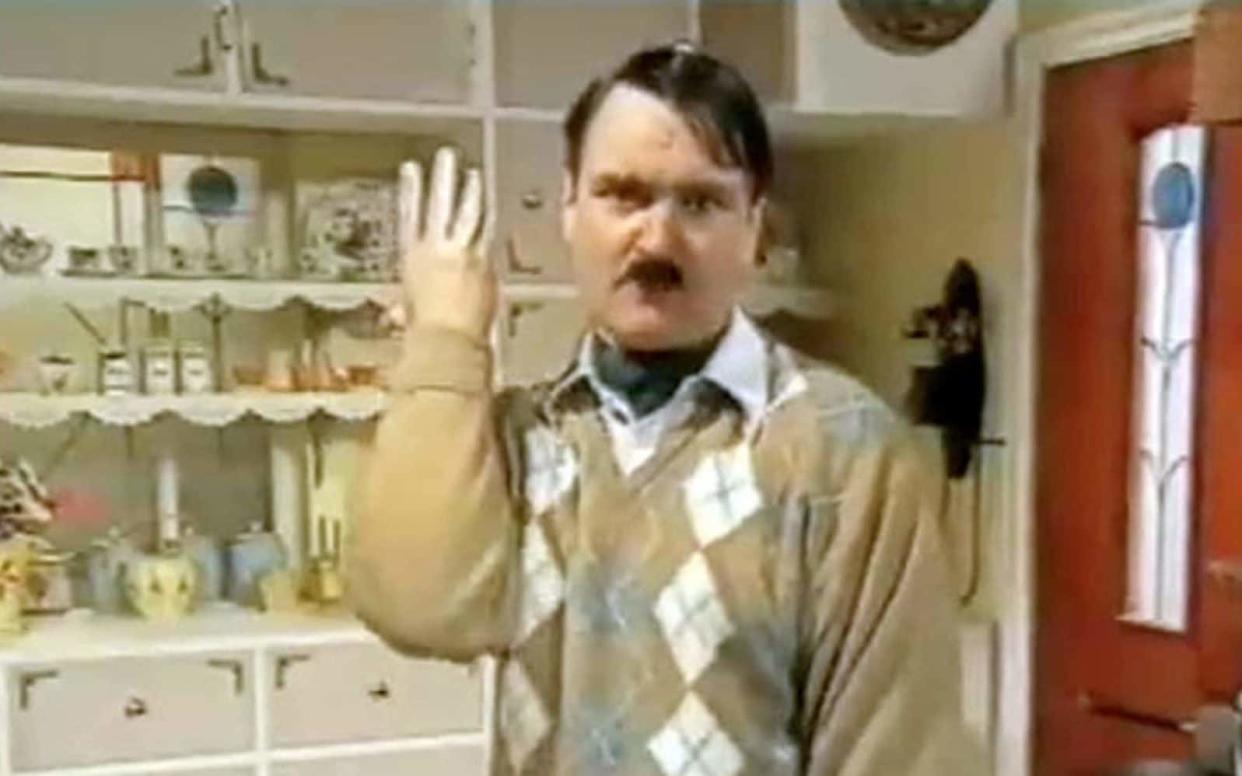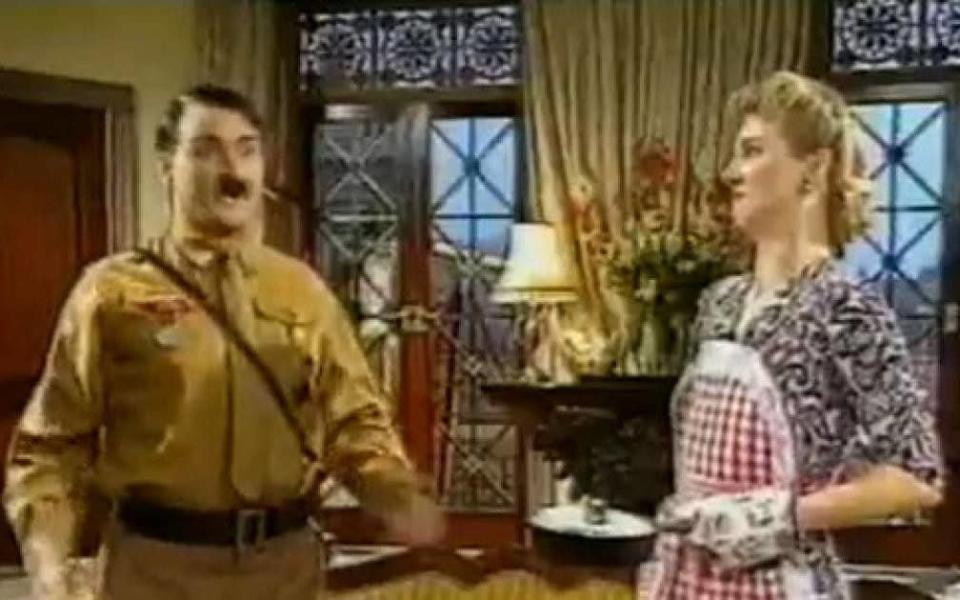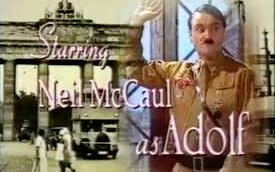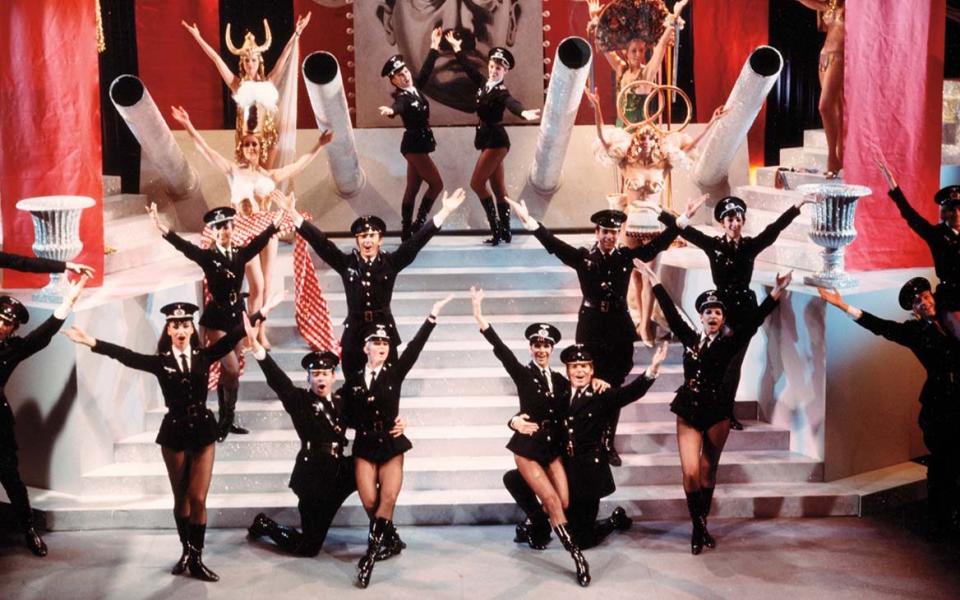Comedy's fastest cancellation: the writer of ‘Hitler sitcom’ Heil Honey I'm Home! tells all

For veteran comedy writer Geoff Atkinson, getting Heil Honey I’m Home! commissioned – a sitcom about Adolf Hitler (yes, that Adolf Hitler) – was “the easiest job ever”. Atkinson recalls pitching the idea at a lunch with people from Noel Gay Television, which had an open production slate with fledging satellite broadcaster BSB.
“I told them I’d been playing with this idea and people seemed quite excited,” says Atkinson. “I wrote up about half a script and everyone was very pleased. It was simple to get it commissioned. There was no push back.”
On paper – or even in reality, depending on your perspective – Heil Honey I’m Home! could be the most tasteless, offensive British comedy ever conceived: set in 1938 Berlin, it's a parody of 1950s-style American sitcoms, in which Adolf Hitler and Eva Braun live next door to a Jewish couple, the Goldensteins.
In 2020, with ever-growing sensitivities and a so-called culture war being fought over what can and can't be said, it seems outrageous that Heil Honey would even be considered. Never mind go into full series production.
Multiple episodes were filmed, but only the pilot ever made it to air. It was broadcast on BSB’s light entertainment channel Galaxy on September 30, 1990, following an episode of Dad's Army. Neil McCaul played Hitler, with DeNica Fairman as Eva Braun – replaced after the pilot by Maria Friedman – and Gareth Marks and Caroline Gruber as Arny and Rosa Goldenstein.
Heil Honey I'm Home! was pulled amid a merger between BSB and Sky, and in the 30 years since it’s built a notoriety, wrongly remembered as Love Thy Neighbour taken to the extreme. It's often included in round-ups called things like “What were they thinking?!” or “Worst TV moments ever!”
Conceptually, Heil Honey is almost brilliant: a sitcom deconstruction that feels years ahead of its time – something that might have featured in Chris Morris’s Brass Eye as part of a story on lowering TV standards. And Heil Honey also had the potential for more satirical heft than other Nazi-lampooning comedies from the era (see ‘Allo ‘Allo'a camp Gestapo officers, chasing the “Fallen Madonna with the Big Boobies” around France).
Heil Honey spoofed sitcoms such as I Love Lucy and The Honeymooners. McCaul’s Hitler is a knowing riff on The Honeymooners’s Jackie Gleason – or a fascist Fred Flintstone, who was also based on Gleason – played as a brash, hen-pecked husband with a bellowing Brooklyn accent.
“You may be big stuff in Germany," spits Eva, as she accuses Adolf of paying her less attention than Goebbels. "But I remember you when you were just a house painter!”
“Boy, this is gonna be some night!” Hitler quips to the camera.
Atkinson recalls the tag line – “By day he runs the country, by night she rules the nest!” – but says that it wasn’t as trivial as using Hitler to send up sitcoms. “That would be the wrong reason to do it,” he says. “That seems an awfully inflammatory idea.” The framing of a Fifties sitcom was intended to be a legitimate means of poking fun at Hitler, reflecting post-war perspectives.

“There was a sense that this could have played in the Fifties, whereas it couldn’t play today,” Atkinson says about the concept. “It’s that spirit you see in things like Hogan’s Heroes. There was a willingness to laugh at Hitler in the war and just afterwards. There’s been a shift in perspective.”
Atkinson is careful not to label Heil Honey as satire, the meaning and success of which can be as subjective as any comedy (“Satire is a hard label to attach,” he says). But beneath the farce, he saw Heil Honey as a comment on the appeasement of Hitler in 1938. Heavy themes for a frothy studio sitcom.
“It’s an idea that goes for all these bullies,” says Atkinson. “When do you step in? When do you step back? There was this period before the war when it was clear that Hitler was a monster but we didn’t confront him. What happened in Berlin in 1938 was horrendous – so if you’re Jewish and live next door to Adolf Hitler, what the hell do you do? It was playing around with those notions, and the idea of not being blind to the truth. But I don’t think we got it quite right.”
The pilot – which is available on YouTube – begins with a prologue explaining that Heil Honey I’m Home! was produced in the Fifties by fictional TV executive Brandon Thalburg Jnr but was all-but forgotten – until the tapes were recently rediscovered in the vaults of Burbank Studios.
In the episode, Neville Chamberlain is coming for drinks, and Hitler wants to trick Chamberlain into thinking he’s a good boy really. But when the overbearing Goldensteins, who live in the next apartment, hear that Chamberlain is coming, they invite themselves over.
Hitler tries to get rid of them by plying them with schnapps, but the plan backfires. Embarrassed by the drunken Goldensteins, Hitler ends up signing the Munich Agreement. “This guarantees you won’t be a naughty boy again,” says Chamberlain.
"Like any first series, there would be things that didn’t work," says Atkinson. "But because of the sensitive subject it was tougher. With a normal sitcom there’s time to find your feet. With this, from day one you were having to answer for it."
Watching it now, it's easy to see where it goes wrong: the Goldensteins aren’t self-aware enough to go beyond the Jewish stereotypes on which they’re deliberately based. Atkinson says that if he were to remake Heil Honey now, the Goldensteins would have the upper hand.

“If they’d landed punches on Hitler we’d have rooted for them,” he says. “We needed to let them win more.”
There are some good gags – “Do you want it to get out that Adolf Hitler insults his neighbours?” asks Eva Braun about Adolf keeping up appearances – but in a show that tries to both parody the Fifties and get laughs out of history’s greatest monster, comedy is a problem. Emulating cornball lines and scenarios – mother in-law gags, a drunken conga line singing "We came, we saw, we conquered!" – means that the real joke is the premise itself. Atkinson says it needed “really sharp wisecracking Bilko humour” but fell short of those (admittedly high comedy) standards.
“We weren’t quite there with that,” he says. “If you look at Bilko, those scripts stand up – they’re not gag-driven, but situation and character-driven. Heil Honey was meant to be the same thing – except the character is Adolf Hitler.”
That is, of course, Heil Honey’s inherent problem. The appeal of Sgt Bilko, Jackie Gleason, or Fred Flintstone is that they’re everymen. We want them to win. Hitler is too cutesy (“I’m a very, very bad Hitler,” he says, slapping his own hand in jest – not for invading Czechoslovakia, but because he’s late home for schnitzel), with his feet up in victory at the end, having duped Chamberlain and got rid of the Goldensteins.
As Sidney Homan and Hernán Vera write in their book, Hitler in the Movies: “The controversy over showing a human side to Hitler may admit a larger issue: we cannot bear the fact he was one of us."
It was a question that Atkinson pondered during the writing process. “There was real pathos in Bilko – light and shade,” says Atkinson. “You cared for Bilko. But you can’t care for Hitler – you can’t empathise with him. That was a big question for us. How do you write that in? It needed skillful writing to crack that. We were on the way but we didn't have the luxury of time. It wasn't a show where you could just work things out."
Hitler has been poked fun at and parodied since before and during the Second World War.
In 1940, The Three Stooges satirised him in You Natzy Spy. Later that same year, Charlie Chaplin released The Great Dictator, playing the dual roles of the Hitler-like Adenoid Hynkel – fascistic ruler of the fictional country Tomainia – and a Jewish barber.
Cartoonists later portrayed Hitler as an always-irate buffoon, the popular image being Hitler with his trousers down, giant swastika bloomers on display. And not forgetting, of course, the comedy lyrics "Hitler has only got one ball" (that’s a particular area of ridicule which persists – only recently, news stories were circulating about Hitler having a micro penis). Charlie Chaplin wrote in his autobiography that he would not have joked about the Nazis if he’d known the full horror of the concentration camps.
Beyond the war, the question is: can – or should – Hitler be used for comedy? Is genocide beyond joking about? Or should any and every subject be on the table artistically? Aren't comedy and art the means through which we make sense of the most harrowing topics?
In British comedy, Spike Milligan, Monty Python, and Freddie Star all impersonated Hitler (when Channel 4 broadcast classic episodes of Big Brother several weeks ago, there were complaints over Michael Barrymore's Hitler impression). Father Ted was mistaken for the Fuhrer. In 2009, Richard Herring grew a Hitler moustache for his stand-up show of the same name. The cabaret performer Frank Sanazi has combined Hitler and Sinatra personas (his posters once advertised that he could be found on Mein Space).
The 2004 film Downfall became a self-perpetuating parody, with Hitler's bunker rant becoming an entire genre of meme. In 2015, the German film Look Who’s Back resurrected Hitler in present day for laughs, and last year Jo Jo Rabbit divided viewers with its playful depiction of Hitler as an imaginary friend.

Arguably, the best Hitler send-up is still Mel Brooks’s 1967 comedy, The Producers (“My favourite film ever, near enough,” says Atkinson) in which a crooked Broadway producer stages the musical Springtime for Hitler: A Gay Romp With Adolf and Eva at Berchtesgaden. Intended to be a flop, the musical’s ridiculous portrayal of Hitler is hailed as genius satire.
“There was always a part of me that wondered what would happen if you really put on Springtime for Hitler as an actual show,” says Atkinson. “Would it have happened like it did in the film? That was always in the back of my mind. There was probably a bit of me thinking, ‘If it’s not a West End show, then what about a sitcom?!’"
Atkinson remembers a real-life Producers moment during the audition process for Heil Honey. “We had a room where people were coming in to read and we’d discuss the character of Adolf Hitler,” he says. “What part of the character do you need to discuss at that point? I remember the surreal-ness of – we were actually doing the bit from the Producers when they’re casting Hitler.”
Unsurprisingly, there was controversy over Heil Honey I’m Home! It was reported at the time that some theatrical agents had refused to send actors to auditions. One US TV critic was so outraged he began pitching ideas for sitcoms about Fidel Castro and Saddam Hussein in his newspaper column.
The Observer reported that the broadcast of the pilot hasd been deferred by a day to avoid clashing with Yom Kippur.
"It was actually going to be broadcast an hour after Yom Kippur ended at dusk," a BSB spokesman said. "But we thought we'd better be ultra-careful."
As reported at the time, Hayim Pinner, the secretary general of the Board of Deputies of British Jews, said: “It’s in very bad taste. We are against any trivialisation of the Second World War, Hitler or the Holocaust, and this certainly trivialises those things. It’s very distasteful and even offensive… I imagine very few intelligent people will watch it once they see a few seconds of it.”
BSB executives defended the show as being “dangerous” rather than offensive.
“You knew from day one it would attract comment and criticism,” says Atkinson. “I did a few interviews – with the Jewish Chronicle and others. To not defend it would have been awful – a sign that I didn’t believe in it. If people didn’t like it, that was their right. You have to accept that comedy is very subjective. All I wanted to do was put across my reasoning and hope people heard that. If people say, ‘I lost my family in the Holocaust,’ you can’t ask them to look again and find it in their heart to see the comedy. That’s a hard audience to talk to.”
Atkinson remembers that the principal cast – which was actually three quarters Jewish once Maria Friedman joined as Eva Braun – were committed and supportive. ("There was a strong Jewish voice on the show," he says. "We had to make sure they were very comfortable"). But after the pilot, there were tensions behind the camera, partly due to a clash with a new showrunner.
“He didn’t like the premise, he didn’t like anything,” says Atkinson. “He basically hated the whole project. It was pretty unpleasant. There were feelings in the production team as well. They were working long hours. It was like the night of the long knives. They were talking about trying to stop it from happening.”
Atkinson left the production after six episodes. In the years since, it's often been assumed that the show was cancelled due to controversy and bad taste. Atkinson recalls it being because of the merger between Sky and BSB in November 1990.
"I remember Paul Jackson [the executive producer] explaining there had been this buyout," says Atkinson. “I suspect the last thing Sky wanted was something that would drive viewers away – they wanted sports rights. The premise was that Heil Honey had been made in the Fifties and sat on a shelf. It played out its own premise perfectly – it was made in the Nineties and has sat on a shelf to this day."
Clips from un-broadcast episodes appeared online in 2016, when Gareth Marks uploaded a comedy show reel to YouTube. Scenes included Hitler and Arny sharing a bed, like an awkward, anti-semitism-charged Morecambe and Wise.
In another scene, Arny dresses up as Hitler, part of a madcap plot of mistaken identity, and mimics one of Hitler’s furious speeches. It's a scene that’s both recognisable as formulaic sitcom fodder, and about as challenging as anything the show could have dreamt up. Other storylines in the un-broadcast episodes would have seen the Mussolinis coming to dinner.
For Atkinson, Heil Honey became bad taste when it marched into silly, trivial, scatological gags. “If we just used it as a vehicle to do old jokes, that wasn’t right," he says. "It should have been as brave in its execution."
Atkinson admits it didn't succeed in exploring appeasement, Berlin, and the tearing down of Hitler – "I don’t think we got that right, the different levels,” he says – but he's since scripted another episode, closer to his vision of what Heil Honey I'm Home! should have been. The episode guest stars Hitler’s brother, "Ziggy". "I still hold out that at one point Heil Honey will find a home," says Atkinson.
The Fifties parody, he tells me, would need to be more authentic if it was made today – possibly even produced in black and white: “It didn’t feel like the Fifties. Or even a good British sitcom of the Nineties!”
Atkinson explains that before lockdown, he was in pre-production on a stage musical about Trump – a continuation of what he was trying to achieve with Heil Honey. "When you’ve got these horrible, all-powerful characters, our job is to bring them down with comedy and laughter," he says. "If you can’t, that’s the test – will they stand up to it? If they crumble, they were men of straw."
Heil Honey I’m Home! is what we would now call problematic. And the reality of anti-semitism persists way into the 21st Century, as seen by the controversy and fallout over grime artist Wiley's anti-semitic rant on Twitter last week.
Is there also a problem with not doing comedy about Hitler? Do we risk giving power back to the monsters we can't joke about? “There’s nothing that destroys somebody like making them into a laughing stock," says Atkinson. "Would Hitler have enjoyed Heil Honey? No. That’s not a bad yardstick.”

